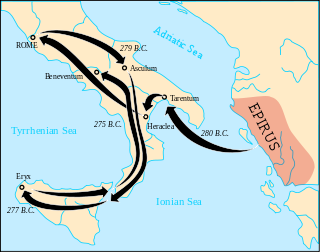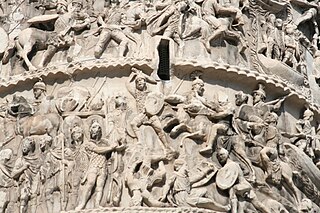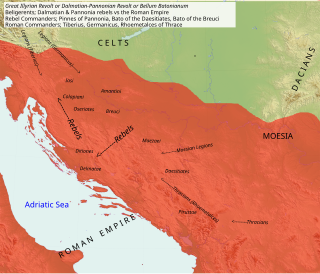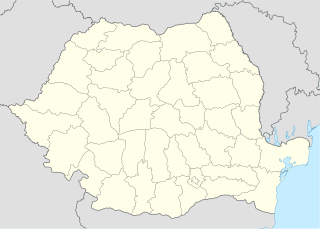Related Research Articles

Caligula was Roman emperor from 37 to 41 AD. The son of the popular Roman general Germanicus and Augustus's granddaughter Agrippina the Elder, Caligula was born into the first ruling family of the Roman Empire, conventionally known as the Julio-Claudian dynasty. Germanicus's uncle and adoptive father, Tiberius, succeeded Augustus as emperor of Rome in 14.

Elagabalus, also known as Heliogabalus, was Roman emperor from 218 to 222. A member of the Severan dynasty, he was Syrian, the second son of Julia Soaemias and Sextus Varius Marcellus. In his early youth he served the god Elagabalus as a priest in Emesa, the hometown of his mother's family. As a private citizen, he was probably named Sextus Varius Avitus Bassianus. Upon becoming emperor he took the name Marcus Aurelius Antoninus Augustus. He was called Elagabalus only after his death.
AD 6 (VI) was a common year starting on Friday of the Julian calendar. At the time, it was known as the Year of the Consulship of Lepidus and Lucius Arruntius the Younger. The denomination "AD 6" for this year has been used since the early medieval period, when the Anno Domini calendar era became the prevalent method in Europe for naming years.

Commodus, born Lucius Aurelius Commodus and died Lucius Aelius Aurelius Commodus, was Roman emperor with his father Marcus Aurelius from 177 until his father's death in 180, and solely until 192. His reign is commonly considered to mark the end of the golden period in the history of the Roman Empire known as the Pax Romana.
Alexander Helios was a Ptolemaic prince and was a son of the Macedonian queen Cleopatra VII of Ptolemaic Egypt by Roman triumvir Mark Antony. Alexander's fraternal twin sister was Cleopatra Selene II. Cleopatra named her son after Alexander the Great. His second name in Ancient Greek means "Sun"; this was the counterpart of his twin sister's second name Selene (Σελήνη), meaning "Moon".

Didius Julianus was the emperor of Rome for nine weeks from March to June 193, during the Year of the Five Emperors.

The Pyrrhic War was a war fought by Pyrrhus, the king of Epirus. Pyrrhus was asked by the people of the Greek city of Tarentum in southern Italy to help them in their war with the Roman Republic.

Artavasdes II was a King of the Kingdom of Armenia from 55 BC until 34 BC and a member of the Artaxiad Dynasty. He was a son of king Tigranes the Great of Armenia and Cleopatra of Pontus, his maternal grandfather was king Mithridates VI of Pontus. Artavasdes II was an ally of Rome and when Marcus Licinius Crassus the Roman proconsul of Syria prepared an invasion of the Parthian Empire Artavasdes offered his assistance. Crassus, not willing to share the glory and spoils of defeating the Parthians, refused Artavasdes offer. The Romans suffered an unexpected defeat at the hands of the Parthian general Surenas while Orodes II, the Parthian king, invaded Armenia and forced Artavasdes to join the Parthians, he gave his sister in marriage to Orodes' son and heir Pacorus.
Dio may refer to:
Lucius Junius Gallio Annaeanus or Gallio was a Roman senator and brother of the famous writer Seneca. He is best known for his impartial judgment of a legal case involving Paul the Apostle in Corinth.
Polemon Pythodoros, also known as Polemon I or Polemon I of Pontus was the Roman Client King of Cilicia, Pontus, Colchis and the Bosporan Kingdom. Polemon was the son and heir of Zenon and possibly Tryphaena. Zenon and Polemon adorned Laodicea with many dedicated offerings.

The Marcomannic Wars were a series of wars lasting over a dozen years from about 166 until 180 AD. These wars pitted the Roman Empire against, principally, the Germanic Marcomanni and Quadi and the Sarmatian Iazyges; there were related conflicts with several other barbarian peoples along both sides of the whole length of the Roman Empire's northeastern European border, the river Danube. The struggle against the Germans and Sarmatians occupied the major part of the reign of Roman emperor Marcus Aurelius, and it was during his campaigns against them that he started writing his philosophical work Meditations, whose book 1 bears the note "Among the Quadi at the Granua".
Bithynium or Bithynion was a city in the interior of Bithynia, lying above Tius, as Strabo describes it, and possessing the country around Salon, which was a good feeding country for cattle, and noted for its cheese. Bithynium was the birthplace of Antinous, the favourite of Hadrian, as Pausanius tells us, who adds that Bithynium is beyond, by which he probably means east of, the river Sangarius; and he adds that the remotest ancestors of the Bithynians are Arcadians and Mantineis. If this is true, which however does not seem probable, a Greek colony settled here. Bithynium was afterwards called Claudiopolis, a name which it is conjectured it first had in the time of Tiberius; but it is strange that Pausanias does not mention this name. Dio Cassius speaks of it under the name of Bithynium and Claudiopolis also. It later bore the name Hadriana after the emperor. The names of Claudiopolis and Hadriana appear on coins minted here.

The Bellum Batonianum was a military conflict fought in the Roman province of Illyricum in the 1st century AD, in which an alliance of native peoples of the two regions of Illyricum, Dalmatia and Pannonia, revolted against the Romans. The rebellion began among native peoples who had been recruited as auxiliary troops for the Roman army. They were led by Bato the Daesitiate, a chieftain of the Daesitiatae in the central part of present-day Bosnia, and were later joined by the Breuci, a tribe in Pannonia led by Bato the Breucian. Many other tribes in Illyria also joined the revolt.

Tigranes IV was a Prince of the Kingdom of Armenia and member of the Artaxiad Dynasty who served as a Roman Client King of Armenia from 8 BC until 5 BC and 2 BC until 1 AD.
Rholes or Roles was a Getae chieftain in Scythia Minor mentioned by Cassius Dio in his Roman History. According to Dio, he helped Roman general Marcus Licinius Crassus defeat the Bastarnae, and when he visited Octavian, he was treated as "a friend and ally" for his support for the Romans. Later he sent for Crassus to help in his conflict with Getae chieftain Dapyx. These events have been dated to 31-27 BC.
Darius of Pontus was a monarch of Iranian and Greek Macedonian ancestry. He was the first child born to King Pharnaces II of Pontus and his Sarmatian wife. He had two younger siblings: a sister called Dynamis and a brother called Arsaces. His paternal grandparents were Mithridates VI, the king of Pontus and his first wife, his sister Laodice.

Tapae was a fortified settlement, guarding Sarmizegetusa, the main political centre of Dacia. Its location was on the Iron Gates of Transylvania, a natural passage breaking between Țarcului and Poiana Ruscă Mountains and connecting Banat to Țara Hațegului. This made it one of the very few points through which invaders could enter Transylvania from the south. Moreover, 8 kilometres down the passage into Țara Hațegului, there is Sarmizegetusa Regia.

The Gold of Tolosa is the appellation used to refer to a semi-legendary treasure hoard seized by the ancient Roman proconsul Quintus Servilius Caepio from the Volcae town of Tolosa, modern-day Toulouse.
References
- Cassius Dio (19 September 2014). Delphi Complete Works of Cassius Dio (Illustrated). Delphi Classics. pp. 8–. GGKEY:HPZS0PKG8YY.
| This article about an Ancient Roman book or literary work is a stub. You can help Wikipedia by expanding it. |